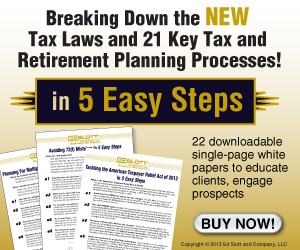This week's Slott Report Mailbag includes questions on the always-complicated Roth IRA 5-year rules and the pro-rata rule. As you can see, this is just the tip of the iceberg when it comes to IRA planning rules. As
always, we stress the importance of working with a
competent, educated financial advisor to keep your retirement
nest egg safe and secure. Find one in your area at this
link.
1.
Hey guys,
I was reading some info on your pages, it is very informative. Regarding the Roth IRA 5-year rule, I had some questions.
 |
| Send questions to [email protected] |
point of the five year rule if you are not 59 1/2? Would I owe a 10% penalty on this? I feel that this subject is never approached from this standpoint no matter which resource I use. I hope you can help. Thanks.
-AJ, Ohio
Answer:
The 5-year period has been met as of January 1, 2013. If you take a distribution from your Roth IRA this year at age 33, the $2K of earnings will be taxable because it’s a non-qualified distribution. Although the 5-year period has been met, you must also be dead, disabled, age 59 ½, or buying a first home for the earnings to be tax-free. You’ll also owe a 10% penalty on the $2K of earnings, unless an exception applies. The $5K of basis is tax and penalty free.
If the $7K distribution is from your Roth 401(k), it is a non-qualified distribution. Although the 5-year period has been met, you must also be either age 59 ½, dead, or disabled. The earnings portion ($2K) is taxable but the basis is tax-free.
Although in your example, the taxation is the same for both a Roth IRA and Roth 401(k), it should be noted that rules for Roth 401(k)s and Roth IRAs are different, and a different example would yield different results.
2.
Dear Sir/Madam,
Many years ago when I started contributing to my 401(k), the only option available for contribution was "after-tax dollars". My employer provided work sheets to track my contributions, their match and yearly earnings in the account. The idea, as I understood it then, was that at time of withdrawal one could take distributions up to one's contributions tax free. Any amount distributed exceeding those after tax contributions, presumed to be earnings, would be taxed at ordinary rates. After a number of years contributing to the "after tax" 401(k)", my employer introduced the "before tax" 401(k). At that point I switched my contributions from the "after tax" to "before tax" and have continued to the present.
My question is: Upon distribution will the "pro-rata rule" apply to my "pre-tax" 401(k) distribution or just the earnings achieved on the "pre-tax" contributions? I'm aware of the 10% penalty if withdrawn prior to 59.5 years of age, (I'm 56) but want to understand how the rule applies to my long ago contributions to the "after tax" 401(k). I am evaluating the option of rolling over these "after tax" funds into a Roth IRA and want to understand the tax implications. I learned a lot from reading "The Retirement Savings Time Bomb...and How to Defuse it" but was not certain how the pro-rata rule applies to a 401(k). I understand how it applies to the mix of "before" and "after" tax in an IRA but not sure if it applies equally to the 401(k), particularly to funds contributed prior to the "before tax" 401(k) came into existence. Any guidance you can provide is appreciated.
Thank you,
Manuel Valdes
Answer:
When converting plan funds to the Roth IRA, only the pre-tax funds are taxable. The only way to roll over (convert) just the after-tax amount to a Roth IRA tax-free would be to receive your entire 401(k) balance payable to you and use the 60-day rollover rule to first move your pre-tax funds to an IRA and then move the after-tax funds to a Roth IRA. However, the 20% withholding rules will apply to the 401(k) distribution. To complete your rollover, you will need to be able to replace the withheld amounts with personal funds. The issue of separating pre-tax and after-tax employer plan money is complex and should be addressed with a tax adviser with experience in employer plan rules. There are also different rules for after-tax contributions made before 1987 and after-tax contributions made after 1986, if they are separately accounted for by your employer.
3.
I have been doing backdoor Roth contributions for several years, but have not done my 2012 or 2013 contributions/conversions yet. I will most likely roll over a 401(k) into an IRA in 2013. If I convert a traditional IRA to a Roth now and then do the 401(k) rollover later in the year, will I need to pay pro- rata taxes on the converted amount? Essentially, are taxes calculated using my pre-tax IRA holdings at the time of the conversion (none) or at the end of the tax year?
Thanks for your help.
Kate
Answer:
The pro-rata rule will take into account any funds rolled into the IRA during the year.
-By Joe Cicchinelli and Jared Trexler












0 comments:
Post a Comment